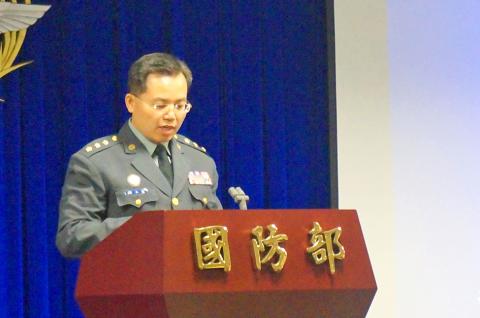The Ministry of National Defense yesterday confirmed that it is to create a military technology research establishment next year, saying that it would be similar to the US Defense Advanced Research Projects Agency (DARPA).
Deputy Minister of National Defense Lee Hsi-ming (李喜明) first mentioned the program at the recent Taiwan-US Defense Industry Conference in Williamsburg, Virginia.
Yu Yu-tang (游玉堂), head of the Technology Planning Division of the ministry’s Department of Resources Planning, yesterday said that the division would be remodeled and upgraded to serve the national technology development role.

Photo: Tu Chu-min, Taipei Times
The division is to be remodeled as the National Defense Technology Division on Jan. 1 next year with a budget of NT$3 billion (US$94.9 million), and it is to be upgraded at some point to become the National Defense Technology Office, a special establishment at the departmental level, Yu said.
The division’s operations are to be modeled after DARPA, especially with regard to facilitating cooperation between the public and private sectors, eliminating duplication of effort and evaluating work at the National Chungshan Institute of Science and Technology, Yu said.
“In contrast with the division’s current practice of having a military officer heading the unit, it is to have a civilian with a doctoral degree in charge after the rebranding, with a major general or rear admiral as its deputy head,” Yu said.
A total of 23 managers are to be recruited, with salaries competitive with those in the private sector, while employment guidelines are to be completed in the first half of next year and recruitment is to begin in about October next year, Yu said.
In response to questions comparing the proposed establishment with Taiwan Goal Co — a publicly funded arms firm that was dissolved in March 2008 — Yu said an official apparatus cannot be compared with a private arms company, adding that the operations of the planned agency would be subject to legislative oversight.
Taiwan Goal was dissolved by the Ministry of Economic Affairs two months following its launch after Chinese Nationalist Party (KMT) lawmakers said it was inappropriate for the government to be involved in the arms trade.
According to information from the ministry, the National Defense Technology Development and Application Committee is to be upgraded and renamed as the National Defense Technology Development Committee.

Several Chinese Nationalist Party (KMT) officials including Chairman Eric Chu (朱立倫) are to be summoned for questioning and then transferred to prosecutors for holding an illegal assembly in Taipei last night, the Taipei Police said today. Chu and two others hosted an illegal assembly and are to be requested to explain their actions, the Taipei City Police Department's Zhongzheng (中正) First Precinct said, referring to a protest held after Huang Lu Chin-ju (黃呂錦茹), KMT Taipei's chapter director, and several other KMT staffers were questioned for alleged signature forgery in recall petitions against Democratic Progressive Party (DPP) legislators. Taipei prosecutors had filed

Taiwan would welcome the return of Honduras as a diplomatic ally if its next president decides to make such a move, Minister of Foreign Affairs Lin Chia-lung (林佳龍) said yesterday. “Of course, we would welcome Honduras if they want to restore diplomatic ties with Taiwan after their elections,” Lin said at a meeting of the legislature’s Foreign Affairs and National Defense Committee, when asked to comment on statements made by two of the three Honduran presidential candidates during the presidential campaign in the Central American country. Taiwan is paying close attention to the region as a whole in the wake of a

NEW WORLD: Taiwan is pursuing innovative approaches to international relations through economics, trade and values-based diplomacy, the foreign minister said Taiwan would implement a “three-chain strategy” that promotes democratic values in response to US tariffs, Minister of Foreign Affairs Lin Chia-lung (林佳龍) said. Taiwan would aim to create a “global democratic value chain,” seek to capitalize on its position within the first island chain and promote a “non-red supply chain,” Lin was quoted as saying in the ministry’s written report to the Legislative Yuan submitted ahead of the legislature’s Foreign Affairs and National Defense Committee meeting slated for today. The Ministry would also uphold a spirit of mutual beneficial collaboration, maintaining close communication and consultations with Washington to show that Taiwan-US cooperation

Taiwan and the US have begun trade negotiations over tariffs imposed by US President Donald Trump earlier this month, Minister of Foreign Affairs Lin Chia-lung (林佳龍) said in an interview this morning before reporting to the Legislative Yuan’s Foreign Affairs and National Defense Committee. The Taipei Economic and Cultural Representative Office (TECRO), Taiwan’s de facto embassy in the US, has already established communication channels with the US Department of State and the US Trade Representative (USTR), and is engaging in intensive consultations, he said. Points of negotiation include tariffs, non-tariff trade barriers and issues related to investment, procurement and export controls, he